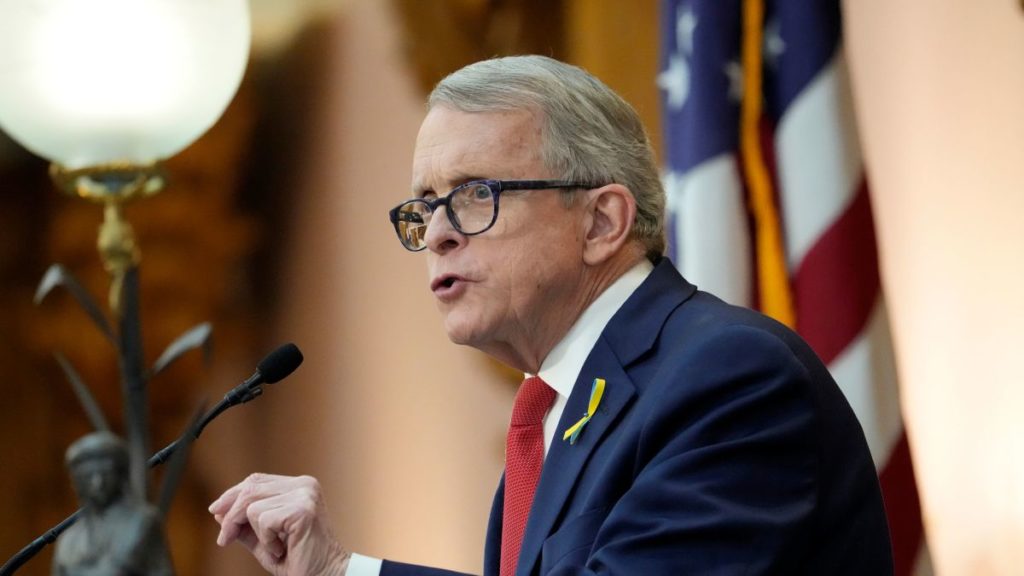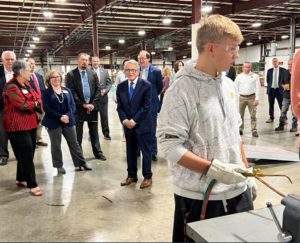Ohio governor includes school choice, family-related tax cuts at forefront of proposed budget
(The Center Square) – Ohio Gov. Mike DeWine put education center stage Tuesday, saying the state’s future is defined by how well children are educated.
He outlined an education focus on…

(The Center Square) – Ohio Gov. Mike DeWine put education center stage Tuesday, saying the state’s future is defined by how well children are educated.
He outlined an education focus on literacy that includes new reading curriculum and professional development in his annual state of the state address to the General Assembly, while promising to spend one-time federal money on one-time expenditures to keep the state away from a fiscal cliff.
“The budget that I will present to you later today reflects the moral imperative we have to see that all Ohioans are fully educated, and therefore, have the tools to live up to their full God-given potential,” DeWine told a joint session of the General Assembly. “Our budget is fiscally sound – spending one-time money on one-time expenditures, averting a fiscal cliff in future years when this one-time money is gone.”
DeWine also is asking the state to pay for a school resource officer in all schools – public and private – in the state. The two-fold reasoning, according to DeWine, is providing safety and creating a trust between students and police officers.
Overall, DeWine is proposing the state continue with its new school funding formula, which was passed two years ago, and the budget would expand families who qualify for the state’s school choice scholarship to 400% above the federal poverty level. Also, DeWine wants to increase funding for charter schools.
Senate President Matt Huffman, R-Lima, said the expansion would practically create universal availability to alternative education to everyone in Ohio. Huffman also said the fiscal details of DeWine’s proposals aren’t available yet and need to be seen.
The proposed budget, which likely will be amended and debated before being agreed upon and signed closer to June or early July, also includes $300 million in one-time funding for capital improvements and equipment for career tech education.
House Speaker Jason Stephens, R-Kitts Hill, also wants to see more details.
“The Ohio House of Representatives looks forward to reviewing Gov. Mike DeWine’s priorities in more detail. I applaud the investment in the people of our great state,” Stephens said. “Good fiscal stewardship requires that we must look beyond a two-year budget cycle to ensure sustainability and solvency for the state of Ohio. It’s time for the people’s House to get to work.”
At the higher education level, DeWine wants to provide need-based financial aid for community colleges and regional campuses for the first time and expand eligibility to the state’s scholarship program to $6,000 per student renewable for four years. He also announced a plan to give a student graduating in the top 5% of their graduating class a $5,000 scholarship – also renewable for four years – if they attend college in the state.
DeWine’s proposed budget also takes aim reducing costs for families by calling for a repeal of the state sales tax on diapers and other infant supplies and a $2,500 per child tax deduction. He also wants to add 15,000 families who qualify for child care.
He proposed creating a new cabinet level position called the Department of Children and Youth Services that would consolidate services from six state agencies and focus on children’s issues.
“We’re excited about the prospects of this agency and what it means for families and their children,” DeWine said.
The governor announced a goal to develop large, shovel-ready sites to lure economic development to each area of the state by creating the All Ohio Future Fund, a one-time investment of $2.5 billion to prepare infrastructure of large economic development sites.
He also called for a greater focus and more funding for mental health and affordable housing across the state by creating the state low-income and single-family tax credits. Also, he is calling for a home ownership savings account that would allow Ohioans to save for a down payment at a reduced tax rate.
DeWine also called for $40 million in law enforcement training for de-escalation, use of force and crisis intervention for those dealing with mental health issues, and a state commitment to fully-fund the next generation 911 system in every community.
“I’ve tried today to be crystal clear where I think we should go as a state,” DeWine said. “All of us must remember, and I think take comfort in, the fact the greatest in our state lies not so much in our leaders but the wisdom and the common sense and the goodness of our people.”



